formerly eScholarship Editions


|
|
|
|
Your request for similar items found 20 book(s). | Modify Search | Displaying 1 - 20 of 20 book(s) | |
| 1. | 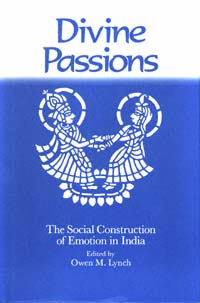 | Title: Divine passions: the social construction of emotion in India Author: Lynch, Owen M 1931- Published: University of California Press, 1990 Subjects: Anthropology | South Asia | History Publisher's Description: Naked holy men denying sexuality and feeling; elderly people basking in the warmth and security provided by devoted and attentive family members; fastidious priests concerned solely with rules of purity and minutiae of ritual practice; puritanical moralists concealing women and sexuality behind purdah's veils - these are familiar Western stereotypes of India. The essays in Divine Passions , however, paint other, more colorful and emotionally alive pictures of India: ecstatic religious devotees rolling in temple dust; gray-haired elders worrying about neglect and mistreatment by family members; priests pursuing a lusty, carefree ideal of the good life; and jokers reviling one another with bawdy, sexual insults at marriages.Drawing on rich ethnographic data from emotion-charged scenarios, these essays question Western academic theories of emotion, particularly those that reduce emotions to physiological sensations or to an individual's private feelings. Presenting an alternative view of emotions as culturally constructed and morally evaluative concepts grounded in the bodily self, the contributors to Divine Passions help dispel some of the West's persistent misconceptions of Indian emotional experience. Moreover, the edition as a whole argues for a new and different understanding of India based on field research and an understanding of the devotional (bhakti) tradition. [brief] Similar Items |
| 2. | 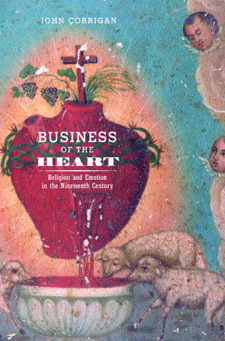 | Title: Business of the heart: religion and emotion in the nineteenth century Author: Corrigan, John 1952- Published: University of California Press, 2001 Subjects: Religion | American Studies | United States History | Christianity Publisher's Description: The "Businessmen's Revival" was a religious revival that unfolded in the wake of the 1857 market crash among white, middle-class Protestants. Delving into the religious history of Boston in the 1850s, John Corrigan gives an imaginative and wide-ranging interpretive study of the revival's significance. He uses it as a focal point for addressing a spectacular range of phenomena in American culture: the ecclesiastical and business history of Boston; gender roles and family life; the history of the theater and public spectacle; education; boyculture; and, especially, ideas about emotion during this period. This vividly written narrative recovers the emotional experiences of individuals from a wide array of little-used sources including diaries, correspondence, public records, and other materials. From these sources, Corrigan discovers that for these Protestants, the expression of emotion was a matter of transactions. They saw emotion as a commodity, and conceptualized relations between people, and between individuals and God, as transactions of emotion governed by contract. Religion became a business relation with God, with prayer as its legal tender. Entering this relationship, they were conducting the "business of the heart." This innovative study shows that the revival--with its commodification of emotional experience--became an occasion for white Protestants to underscore differences between themselves and others. The display of emotion was a primary indicator of membership in the Protestant majority, as much as language, skin color, or dress style. As Corrigan unravels the significance of these culturally constructed standards for emotional life, his book makes an important contribution to recent efforts to explore the links between religion and emotion, and is an important new chapter in the history of religion. [brief] Similar Items |
| 3. |  | Title: Abuses Author: Lingis, Alphonso 1933- Published: University of California Press, 1994 Subjects: Philosophy | Literature | Cultural Anthropology | Social and Political Thought | Psychology | Travel Publisher's Description: Part travelogue, part meditation, Abuses is a bold exploration of central themes in Continental philosophy by one of the most passionate and original thinkers in that tradition writing today.A gripping record of desires, obsessions, bodies, and spaces experienced in distant lands, Alphonso Lingis's book offers no less than a new approach to philosophy - aesthetic and sympathetic - which departs from the phenomenology of Levinas and Merleau-Ponty. "These were letters written to friends," Lingis writes, "from places I found myself for months at a time, about encounters that moved me and troubled me. . . . These writings also became no longer my letters. I found myself only trying to speak for others, others greeted only with passionate kisses of parting."Ranging from the elevated Inca citadel of Machu Picchu, to the living rooms of the Mexican elite, to the streets of Manila, Lingis recounts incidents of state-sponsored violence and the progressive incorporation of third-world peoples into the circuits of exchange of international capitalism. Recalling the work of such writers as Graham Greene, Kathy Acker, and Georges Bataille, Abuses contains impassioned accounts of silence, eros and identity, torture and war, the sublime, lust and joy, and human rituals surrounding carnival and death that occurred during his journeys to India, Bangladesh, Thailand, Bali, the Philippines, Antarctica, and Latin America. A deeply unsettling book by a philosopher of unusual imagination, Abuses will appeal to readers who, like its author, "may want the enigmas and want the discomfiture within oneself." [brief] Similar Items |
| 4. | 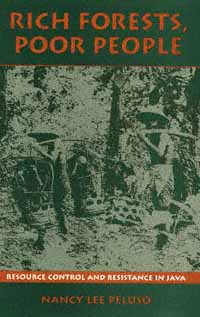 | Title: Rich forests, poor people: resource control and resistance in Java Author: Peluso, Nancy Lee Published: University of California Press, 1992 Subjects: Anthropology | Ecology | Southeast Asia | Environmental Studies | Anthropology Publisher's Description: Peluso untangles the complex of peasant and state politics that has developed in Java over three centuries. Similar Items |
| 5. |  | Title: Factory daughters: gender, household dynamics, and rural industrialization in Java Author: Wolf, Diane L Published: University of California Press, 1992 Subjects: Gender Studies | Sociology | Southeast Asia | Anthropology Similar Items |
| 6. | 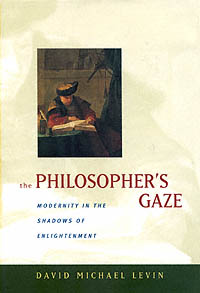 | Title: The philosopher's gaze: modernity in the shadows of enlightenment Author: Levin, David Michael 1939- Published: University of California Press, 1999 Subjects: Philosophy | Gender Studies | Art History | Art Theory Publisher's Description: David Michael Levin's ongoing exploration of the moral character and enlightenment-potential of vision takes a new direction in The Philosopher's Gaze . Levin examines texts by Descartes, Husserl, Wittgenstein, Nietzsche, Heidegger, Benjamin, Merleau-Ponty, and Lévinas, using our culturally dominant mode of perception and the philosophical discourse it has generated as the site for his critical reflections on the moral culture in which we are living.In Levin's view, all these philosophers attempted to understand, one way or another, the distinctive pathologies of the modern age. But every one also attempted to envision - if only through the faintest of traces, traces of mutual recognition, traces of another way of looking and seeing - the prospects for a radically different lifeworld. The world, after all, inevitably reflects back to us the character, the reach and range, of our vision.In these provocative essays, the author draws on the language of hermeneutical phenomenology and at the same time refines phenomenology itself as a method of working with our experience and thinking critically about the culture in which we live. [brief] Similar Items |
| 7. | 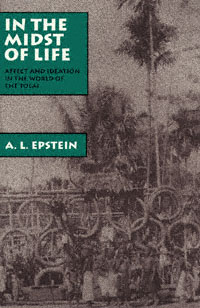 | Title: In the midst of life: affect and ideation in the world of the Tolai Author: Epstein, A. L. (Arnold Leonard) Published: University of California Press, 1992 Subjects: Anthropology | Asian Studies | Cultural Anthropology Publisher's Description: The Tolai are among the most distinctive of Papua New Guinea's indigenous peoples. For all their success in the pursuit of modernity, the Tolai remain traditional in their attitudes toward death, the cultural elaboration of which colors almost every aspect of their existence.In his new book, A. L. Epstein develops an emotional profile of the Tolai, contending that societies are distinguished as much by the shape of their emotional life as they are by their social arrangements and cultural styles. Epstein describes a wide range of mourning ceremonies and other more and less public occasions. By investigating not only the words that stand for emotions but also the way affect enters into and informs people's conduct, he charts a new course for ethnography that seeks to integrate the study of the emotions into anthropological analysis. [brief] Similar Items |
| 8. | 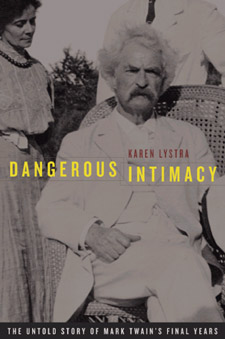 | Title: Dangerous intimacy: the untold story of Mark Twain's final years Author: Lystra, Karen Published: University of California Press, 2004 Subjects: Literature | Autobiographies and Biographies | Twain | American Literature | American Studies Publisher's Description: The last phase of Mark Twain's life is sadly familiar: Crippled by losses and tragedies, America's greatest humorist sank into a deep and bitter depression. It is also wrong. This book recovers Twain's final years as they really were - lived in the shadow of deception and prejudice, but also in the light of the author's unflagging energy and enthusiasm. Dangerous Intimacy relates the story of how, shortly after his wife's death in 1904, Twain basked in the attentions of Isabel Lyon, his flirtatious - and calculating - secretary. Lyon desperately wanted to marry her boss, who was almost thirty years her senior. She managed to exile Twain's youngest daughter, Jean, who had epilepsy. With the help of Twain's assistant, Ralph Ashcroft, who fraudulently acquired power of attorney over the author's finances, Lyon nearly succeeded in assuming complete control over Twain's life and estate. Fortunately, Twain recognized the plot being woven around him just in time. So rife with twists and turns as to defy belief, the story nonetheless comes to undeniable, vibrant life in the letters and diaries of those who witnessed it firsthand: Katy the housekeeper, Jean, Lyon, and others whose own distinctive, perceptive, often amusing voices take us straight into the heart of the Clemens household. Just as Twain extricated himself from the lies, prejudice, and self-delusion that almost turned him into an American Lear, so Karen Lystra liberates the author's last decade from a century of popular misunderstanding. In this gripping book we at last see how, late in life, this American icon discovered a deep kinship with his youngest child and continued to explore the precarious balance of love and pain that is one of the trademarks of his work. [brief] Similar Items |
| 9. | 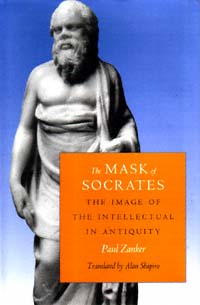 | Title: The mask of Socrates: the image of the intellectual in antiquity Author: Zanker, Paul Published: University of California Press, 1996 Subjects: Classics | Art History | Art and Architecture | Ancient History Publisher's Description: This richly illustrated work provides a new and deeper perspective on the interaction of visual representation and classical culture from the fifth century B.C. to the fourth century A.D. Drawing on a variety of source materials such as Graeco-Roman literature, historiography, and philosophy, in addition to artistic renderings, Paul Zanker forges the first comprehensive history of the visual representation of Greek and Roman intellectuals. He takes the reader from the earliest visual images of Socrates and Plato to the figures of Christ, the Apostles, and contemporaneous pagan and civic dignitaries.Through his interpretations of postures, gestures, facial expressions, and stylistic changes of particular set pieces, we come to know these great poets and philosophers through all of their various personas - the prophetic wise man, the virtuous democratic citizen, or the self-absorbed bon vivant. Zanker's analysis of how the iconography of influential thinkers and writers changed demonstrates the rise and fall of trends and the movement of schools of thought and belief, each successively embodying the most valued characteristics of the period and culture. [brief] Similar Items |
| 10. | 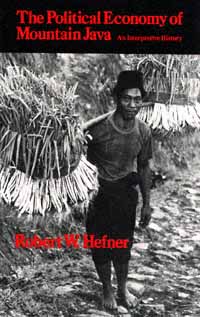 | Title: The political economy of mountain Java: an interpretive history Author: Hefner, Robert W 1952- Published: University of California Press, 1990 Subjects: Anthropology | Asian History | Sociology | Cultural Anthropology | Southeast Asia | Politics Similar Items |
| 11. | 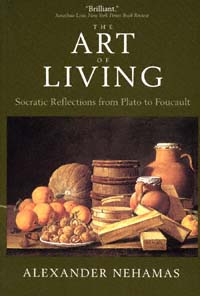 | Title: The art of living: Socratic reflections from Plato to Foucault Author: Nehamas, Alexander 1946- Published: University of California Press, 1998 Subjects: Classics | Classical Philosophy | Classical Literature and Language | Philosophy | Social and Political Thought | Literature Publisher's Description: For much of its history, philosophy was not merely a theoretical discipline but a way of life, an "art of living." This practical aspect of philosophy has been much less dominant in modernity than it was in ancient Greece and Rome, when philosophers of all stripes kept returning to Socrates as a model for living. The idea of philosophy as an art of living has survived in the works of such major modern authors as Montaigne, Nietzsche, and Foucault. Each of these writers has used philosophical discussion as a means of establishing what a person is and how a worthwhile life is to be lived. In this wide-ranging, brilliantly written account, Alexander Nehamas provides an incisive reevaluation of Socrates' place in the Western philosophical tradition and shows the importance of Socrates for Montaigne, Nietzsche, and Foucault.Why does each of these philosophers - each fundamentally concerned with his own originality - return to Socrates as a model? The answer lies in the irony that characterizes the Socrates we know from the Platonic dialogues. Socratic irony creates a mask that prevents a view of what lies behind. How Socrates led the life he did, what enabled or inspired him, is never made evident. No tenets are proposed. Socrates remains a silent and ambiguous character, forcing readers to come to their own conclusions about the art of life. This, Nehamas shows, is what allowed Montaigne, Nietzsche, and Foucault to return to Socrates as a model without thereby compelling them to imitate him.This highly readable, erudite study argues for the importance of the tradition within Western philosophy that is best described as "the art of living" and casts Montaigne, Nietzsche, and Foucault as the three major modern representatives of this tradition. Full of original ideas and challenging associations, this work will offer new ways of thinking about the philosophers Nehamas discusses and about the discipline of philosophy itself. [brief] Similar Items |
| 12. | 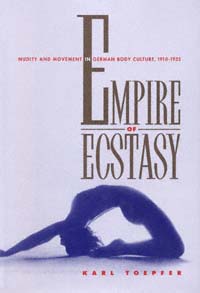 | Title: Empire of ecstasy: nudity and movement in German body culture, 1910-1935 Author: Toepfer, Karl Eric 1948- Published: University of California Press, 1997 Subjects: Cinema and Performance Arts | German Studies | Gender Studies | Dance Publisher's Description: Empire of Ecstasy offers a novel interpretation of the explosion of German body culture between the two wars - nudism and nude dancing, gymnastics and dance training, dance photography and criticism, and diverse genres of performance from solo dancing to mass movement choirs. Karl Toepfer presents this dynamic subject as a vital and historically unique construction of "modern identity." The modern body, radiating freedom and power, appeared to Weimar artists and intelligentsia to be the source of a transgressive energy, as well as the sign and manifestation of powerful, mysterious "inner" conditions. Toepfer shows how this view of the modern body sought to extend the aesthetic experience beyond the boundaries imposed by rationalized life and to transcend these limits in search of ecstasy. With the help of much unpublished or long-forgotten archival material (including many little-known photographs), he investigates the process of constructing an "empire" of appropriative impulses toward ecstasy. Toepfer presents the work of such well-known figures as Rudolf Laban, Mary Wigman, and Oskar Schlemmer, along with less-known but equally fascinating body culture practitioners. His book is certain to become required reading for historians of dance, body culture, and modernism. [brief] Similar Items |
| 13. |  | Title: Final judgments: duty and emotion in Roman wills, 200 B.C.-A.D. 250 Author: Champlin, Edward 1948- Published: University of California Press, 1991 Subjects: Classics | Ancient History Publisher's Description: Freed from the familial and social obligations incumbent on the living, the Roman testator could craft his will to be a literal "last judgment" on family, friends, and society. The Romans were fascinated by the contents of wills, believing the will to be a mirror of the testator's true character and opinions. The wills offer us a unique view of the individual Roman testator's world. Just as classicists, ancient historians, and legal historians will find a mine of information here, the general reader will be fascinated by the book's lively recounting of last testaments.Who were the testators and what were their motives? Why do family, kin, servants, friends, and community all figure in the will, and how are they treated? What sort of afterlife did the Romans anticipate? By examining wills, the book sets several issues in a new light, offering new interpretations of, or new insights into, subjects as diverse as captatio (inheritance-seeking), the structure of the Roman family, the manumission of slaves, public philanthropy, the afterlife and the relation of subject to emperor.Champlin's principal argument is that a strongly felt "duty of testacy" informed and guided most Romans, a duty to reward or punish all who were important to them, a duty which led them to write their wills early in life and to revise them frequently. [brief] Similar Items |
| 14. | 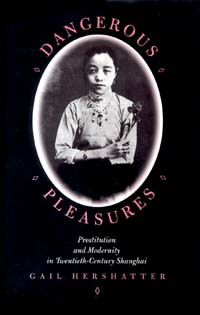 | Title: Dangerous pleasures: prostitution and modernity in twentieth-century Shanghai Author: Hershatter, Gail Published: University of California Press, 1997 Subjects: History | Women's Studies | China Publisher's Description: This pioneering work examines prostitution in Shanghai from the late nineteenth century to the present. Drawn mostly from the daughters and wives of the working poor and declassè elites, prostitutes in Shanghai were near the bottom of class and gender hierarchies. Yet they were central figures in Shanghai urban life, entering the historical record whenever others wanted to appreciate, castigate, count, regulate, cure, pathologize, warn about, rescue, eliminate, or deploy them as a symbol in a larger social panorama.Over the past century, prostitution has been understood in many ways: as a source of urbanized pleasures, a profession full of unscrupulous and greedy schemers, a changing site of work for women, a source of moral danger and physical disease, a marker of national decay, and a sign of modernity. For the Communist leadership of the 1950s, the elimination of prostitution symbolized China's emergence as a strong, healthy, and modern nation. In the past decade, as prostitution once again has become a recognized feature of Chinese society, it has been incorporated into a larger public discussion about what kind of modernity China should seek and what kind of sex and gender arrangements should characterize that modernity.Prostitutes, like every other non-elite group, did not record their own lives. How can sources generated by intense public argument about the "larger" meanings of prostitution be read for clues to those lives? Hershatter makes use of a broad range of materials: guidebooks to the pleasure quarters, collections of anecdotes about high-class courtesans, tabloid gossip columns, municipal regulations prohibiting street soliciting, police interrogations of streetwalkers and those accused of trafficking in women, newspaper reports on court cases involving both courtesans and streetwalkers, polemics by Chinese and foreign reformers, learned articles by Chinese scholars commenting on the world history of prostitution and analyzing its local causes, surveys by doctors and social workers on sexually transmitted disease in various Shanghai populations, relief agency records, fictionalized accounts of the scams and sufferings of prostitutes, memoirs by former courtesan house patrons, and interviews with former officials and reformers.Although a courtesan may never set pen to paper, we can infer a great deal about her strategizing and working of the system through the vast cautionary literature that tells her customers how not to be defrauded by her. Newspaper accounts of the arrests and brief court testimonies of Shanghai streetwalkers let us glimpse the way that prostitutes positioned themselves to get the most they could from the legal system. Without recourse to direct speech, Hershatter argues, these women have nevertheless left an audible trace. Central to this study is the investigation of how things are known and later remembered, and how, later still, they are simultaneously apprehended and reinvented by the historian. [brief] Similar Items |
| 15. |  | Title: Sentimental men: masculinity and the politics of affect in American culture Author: Chapman, Mary 1962- Published: University of California Press, 1999 Subjects: Literature | American Literature | Popular Culture | History | Men and Masculinity | United States History | Art History | American Studies Publisher's Description: The essays in this volume analyze a wide variety of cultural forms to demonstrate the centrality of masculine sentiment in American literary and cultural history from the early republic to the progressive era. Challenging the association of sentimentality exclusively with femininity in studies of American culture, the contributors analyze sentimentalism not just as a literary genre but as a structure of feeling manifested in many areas: temperance testimonials, begging letters, historiography, philanthropic performance, photography, portraiture, and poetry. Essays from a variety of disciplines - American studies, literature, history, art, gender studies - deconstruct the alignment of reason, commerce, and the public sphere with men, and feelings, domesticity, and the private sphere with women. [brief] Similar Items |
| 16. | 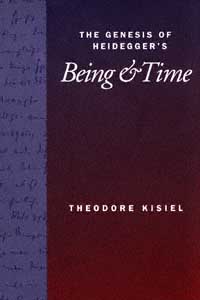 | Title: The genesis of Heidegger's Being and time Author: Kisiel, Theodore J Published: University of California Press, 1995 Subjects: Philosophy | Social and Political Thought | German Studies Publisher's Description: This book, ten years in the making, is the first factual and conceptual history of Martin Heidegger's Being and Time (1927), a key twentieth-century text whose background until now has been conspicuously absent. Through painstaking investigation of European archives and private correspondence, Theodore Kisiel provides an unbroken account of the philosopher's early development and progress toward his masterwork.Beginning with Heidegger's 1915 dissertation, Kisiel explores the philosopher's religious conversion during the bleak war years, the hermeneutic breakthrough in the war-emergency semester of 1919, the evolution of attitudes toward his phenomenological mentor, Edmund Husserl, and the shifting orientations of the three drafts of Being and Time . Discussing Heidegger's little-known reading of Aristotle, as well as his last-minute turn to Kant and to existentialist terminology, Kisiel offers a wealth of narrative detail and documentary evidence that will be an invaluable factual resource for years to come.A major event for philosophers and Heidegger specialists, the publication of Kisiel's book allows us to jettison the stale view of Being and Time as a great book "frozen in time" and instead to appreciate the erratic starts, finite high points, and tentative conclusions of what remains a challenging philosophical "path."This is the first factual and conceptual history of Martin Heidegger's Being and Time (1927), a key twentieth-century text whose background until now has been conspicuously absent. Through painstaking investigation of European archives and private correspondence, Kisiel provides an unbroken account of the philosopher's early development and progress toward his masterwork. [brief] Similar Items |
| 17. | 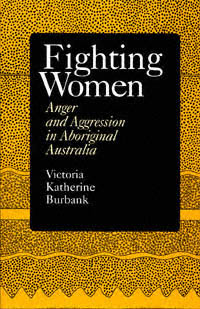 | Title: Fighting women: anger and aggression in Aboriginal Australia Author: Burbank, Victoria Katherine Published: University of California Press, 1994 Subjects: Anthropology | Women's Studies | Psychology Publisher's Description: Fighting is common among contemporary Aboriginal women in Mangrove, Australia - women fight with men and with other women. Victoria Burbank's depiction of these women offers a powerful new perspective that can be applied to domestic violence in Western settings.Noting that Aboriginal women not only talk without shame about their emotions of anger but also express them in acts of aggression and defense, Burbank emphasizes the positive social and cultural implications of women's refusal to be victims. She explores questions of hierarchy and the expression of emotions, as well as women's roles in domestic violence. Human aggression can be experienced and expressed in different ways, she says, and is not necessarily always "wrong." Timely and controversial, Fighting Women will stimulate discussion of aggression and gender relations and will enlarge the debate on the victimization of women and children everywhere. [brief] Similar Items |
| 18. |  | Title: Dear Carnap, dear Van: the Quine-Carnap correspondence and related work Author: Carnap, Rudolf 1891-1970 Published: University of California Press, 1991 Subjects: Philosophy | History and Philosophy of Science | Autobiographies and Biographies Publisher's Description: Rudolf Carnap and W. V. Quine, two of the twentieth century's most important philosophers, corresponded at length - and over a long period of time - on matters personal, professional, and philosophical. Their friendship encompassed issues and disagreements that go to the heart of contemporary philosophic discussions. Carnap (1891-1970) was a founder and leader of the logical positivist school. The younger Quine (1908-) began as his staunch admirer but diverged from him increasingly over questions in the analysis of meaning and the justification of belief. That they remained close, relishing their differences through years of correspondence, shows their stature both as thinkers and as friends. The letters are presented here, in full, for the first time.The substantial introduction by Richard Creath offers a lively overview of Carnap's and Quine's careers and backgrounds, allowing the nonspecialist to see their writings in historical and intellectual perspective. Creath also provides a judicious analysis of the philosophical divide between them, showing how deep the issues cut into the discipline, and how to a large extent they remain unresolved. Dear Carnap, I enclose a copy of a paper which I am ready to send off for publication. . . . I am anxious to have you look this over as soon as possible, to see whether you have reason to suppose the system contradictory: for it looks dangerous. Dear Quine: I read your paper very carefully and with the highest interest. . . . So far, I do not see any contradiction in the system itself . . . but I share your feeling that the whole looks rather dangerous. [brief] Similar Items |
| 19. | 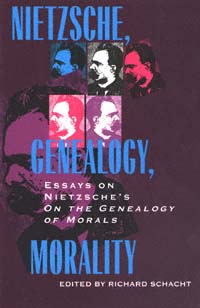 | Title: Nietzsche, genealogy, morality: essays on Nietzsche's Genealogy of morals Author: Schacht, Richard 1941- Published: University of California Press, 1994 Subjects: Philosophy | German Studies | European History | European Literature Publisher's Description: Written at the height of the philosopher's intellectual powers, Friedrich Nietzsche's On the Genealogy of Morals has become one of the key texts of recent Western philosophy. Its essayistic style affords a unique opportunity to observe many of Nietzsche's persisting concerns coming together in an illuminating constellation. A profound influence on psychoanalysis, antihistoricism, and poststructuralism and an abiding challenge to ethical theory, Nietzsche's book addresses many of the major philosophical problems and possibilities of modernity.In this unique collection focusing on the Genealogy , twenty-five notable philosophers offer diverse discussions of the book's central themes and concepts. They explore such notions as ressentiment , asceticism, "slave" and "master" moralities, and what Nietzsche calls "genealogy" and its relation to other forms of inquiry in his work. The book presents a cross section of contemporary Nietzsche scholarship and philosophical investigation that is certain to interest philosophers, intellectual and cultural historians, and anyone concerned with one of the master thinkers of the modern age. [brief] Similar Items |
| 20. | 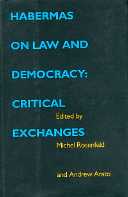 | Title: Habermas on law and democracy: critical exchanges Author: Rosenfeld, Michel 1948- Published: University of California Press, 1998 Subjects: Philosophy | Law | Politics Publisher's Description: In the first essay, Habermas himself succinctly presents the centerpiece of his theory: his proceduralist paradigm of law. The following essays comprise elaborations, criticisms, and further explorations by others of the most salient issues addressed in his theory. The distinguished group of contributors - internationally prominent scholars in the fields of law, philosophy, and social theory - includes many who have been closely identified with Habermas as well as some of his best-known critics. The final essay is a thorough and lengthy reply by Habermas, which not only engages the most important arguments raised in the preceding essays but also further elaborates and refines some of his own key contributions in Between Facts and Norms . This volume will be essential reading for philosophers, legal scholars, and political and social theorists concerned with understanding the work of one of the leading philosophers of our age.These provocative, in-depth debates between Jürgen Habermas and a wide range of his critics relate to the philosopher's contribution to legal and democratic theory in his recently published Between Facts and Norms . Drawing upon his discourse theory, Habermas has elaborated a novel and powerful account of law that purports to bridge the gap between democracy and rights, by conceiving law to be at once self-imposed and binding. [brief] Similar Items |